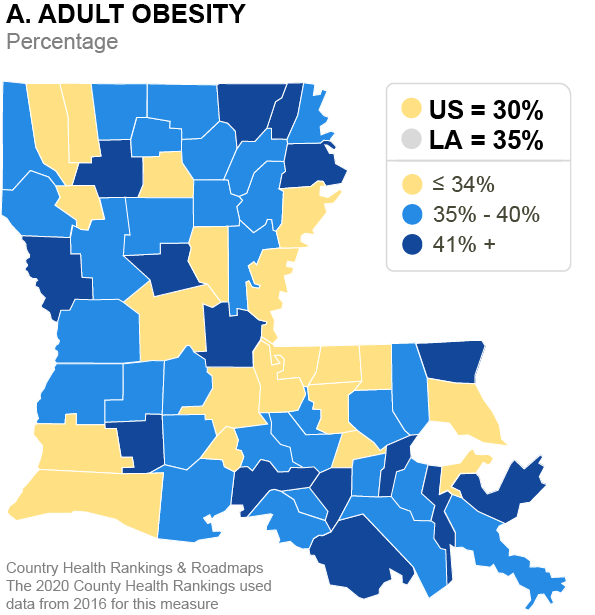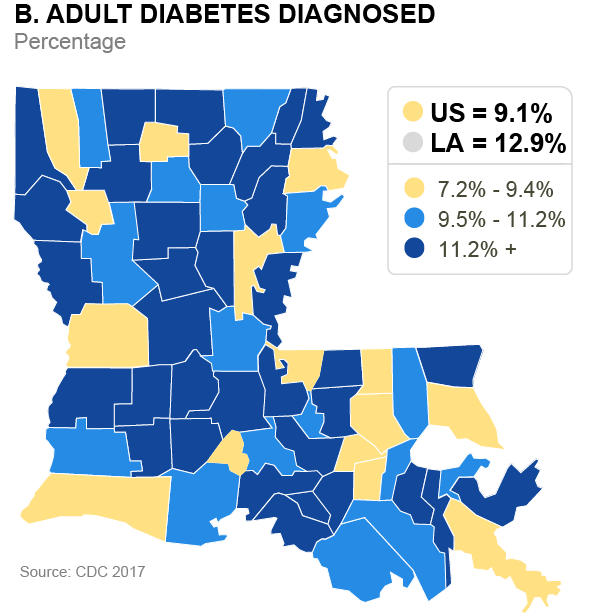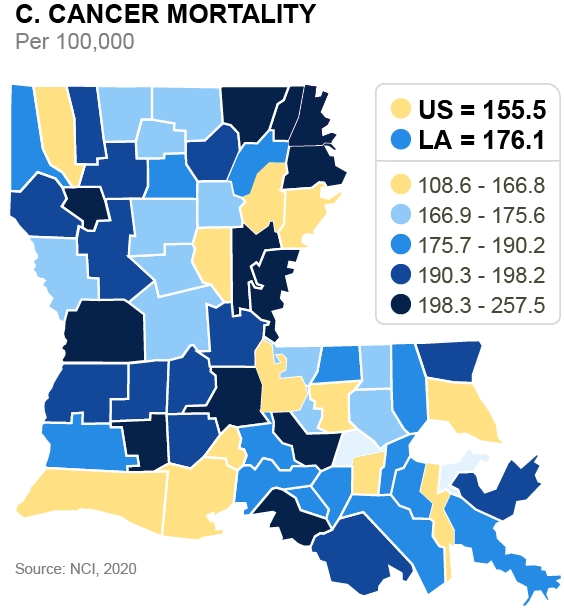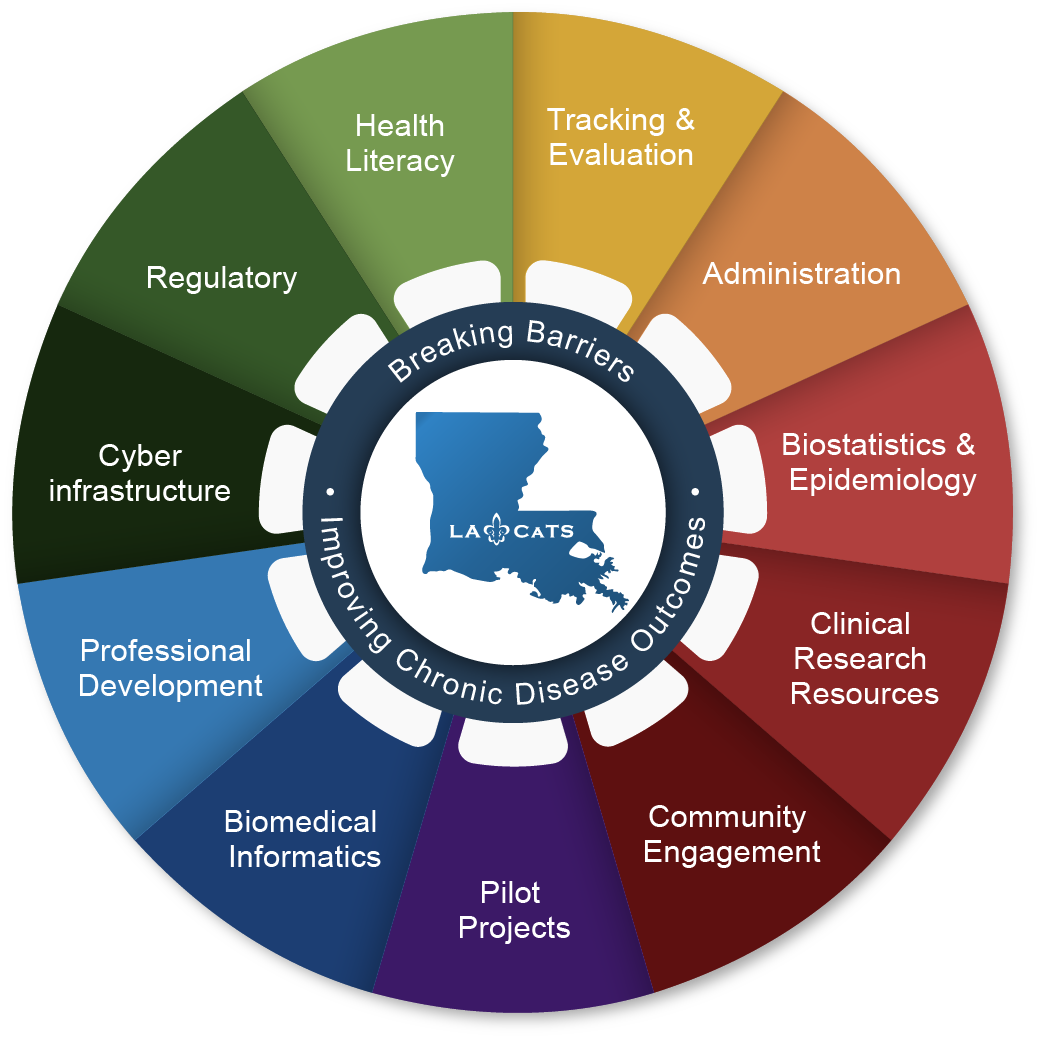LA CaTS Center Overview
I. What is LA CaTS?
The Louisiana Clinical and Translational Science (LA CaTS) Center is a U54 NIH-funded grant under the Institutional Development Award Program Infrastructure for Clinical and Translational Research ( IDeA-CTR ). The LA CaTS Center was originally funded in 2012, and currently in our third funding cycle. We are proud to be a part of the IDeA-CTR network across the country where we are able to share ideas and collaborate with the common goal of enhancing biomedical research activities in IDeA states.

The overarching objective of the LA CaTS Center is to transform the clinical and translational research efforts of our region away from the status quo, where institutions operate in isolation to pursue their institutional missions, and toward a cohesive, mutually supportive enterprise for clinical and translational research. The LA CaTS Center has grown into a single clinical translational science program for Louisiana based on the development of synergistic programs and unparalleled collaboration from all the major academic and biomedical research institutions in the state.
The net result of our collective efforts is the creation of a uniform, state-wide multi-institutional/multidisciplinary research enterprise built on trust, cooperation and collaboration.
II. Who is part of LA CaTS?
The LA CaTS Center combines 10 major Louisiana academic, research, and health care delivery institutions across the state. The LA CaTS Center lead institution is Pennington Biomedical Research Center in Baton Rouge, but our strength is in our strong partner network from New Orleans to Shreveport.
Read more about our partnering institutions
Read more about LA CaTS leadership (Administrative Core)
III. Our Mission & Theme
The LA CaTS Center represents a unified, comprehensive approach targeting the theme of “from barriers to breakthroughs: innovative approaches to chronic disease management in Louisiana”.
The LA CaTS Center’s mission is to support and grow clinical and translational research through partnerships with researchers and the communities we serve. To accomplish our stated mission, the LA CaTS Center has four overarching specific aims.
The LA CaTS Center is continuing to build upon the structure of our IDeA COBREs and INBREs of the state, to increase synergies and maximize communication and collaboration. Most of the state's COBRE and INBRE Principal Investigators have had a voice in the direction of the Center by direct involvement in one of our cores or by serving on governing and advisory committees.
IV. What are we trying to accomplish?
We will build on the experiences and lessons learned from implementing clinical trials during Cycle 2 by expanding multidisciplinary and multi-institutional workforce teams. We will augment the network partnerships to create new research synergies that integrate the strengths, and resources of three additional major healthcare and research institutions into the LA CaTS network.
We will expand Community Advisory Boards to other areas of the state, grow our Community Scholars program; and increase collaboration with Federally Qualified Health Centers and rural-clinic providers, to culturally fine tune and advance research approaches that broaden recruitment and increase retention. We will maintain a critical focus that is mutually beneficial to patients, providers, and investigators so that we can specifically address health challenges and improve health outcomes.
LA CaTS has developed a comprehensive, systematic, and uniform state-wide infrastructure to support all aspects of the research, professional education, and community engagement activities integrated into translational and clinical research, while providing biostatistical, bioinformatics and health literacy support across the entire system. We will employ this infrastructure to address health challenges in communities as they relate to precision medicine (All of Us), the newly funded Precision Nutrition initiative, and the recently funded multicenter cohort trial (RECOVER - in partnership with 7 IDeA-CTRs). LA CaTS, through our cores and investigators, will focus on ensuring that we conduct research that is understandable, impactful, and accessible to all patients across the state.
V. How will we achieve our goals?
To achieve these specific aims, the LA CaTS Center is comprised of cores which provide resources and services to investigators and others across the center. All core leaders and co-leaders serve on the Center's Operations Committee.

Learn more about our cores & resources
VI. What's our story?
Background - The Major Health Concerns in Louisiana
Louisiana’s Chronic Disease Burden : Quality of life and health in Louisiana is adversely impacted by the twin public health burdens of gaps in health and high rates of chronic disease, exacerbated by high rates of poverty and challenges that are among the highest in the nation. Louisiana is in the highest decile for mortality from chronic diseases and ranks 5 th for heart disease and 7 th in the nation for cancer deaths 1 . Louisiana ranks among the lead-states in prevalence of obesity (35%) 4 and diabetes (12.9%) 2. Age-adjusted mortality from cardiovascular disease and cancer deaths 3 are higher relative to national norms 1 .



Using these criteria, all Louisiana parishes (counties) exhibit significant underservice.
Overall, the quality of life in the state is heavily adversely impacted by the public
health burdens of gaps in health and high rates of chronic disease. The simultaneously
high incidence of poverty complicates these other factors and creates an environment
of mutually reinforcing health deficits from which recovery is challenging, to say
the least.
Given the expertise in our stong network of institutions, our combined infrastructure
to conduct significant clinical and translational research, we are uniquely positioned
to study health related problems across the research cycle. Our structure is able
to link very basic research to translational and outcomes research under one umbrella
of support, namely, The LA CaTS Center.
- National Center for Health Statistics. Stats of the State of Louisiana. Retrieved from Centers for Disease Control and Prevention. (2017). https://www.cdc.gov/nchs/pressroom/states/louisiana/louisiana.htm
- National and State Diabetes Trends. (2017). Retrieved from Centers for Disease Control
and Prevention: https://gis.cdc.gov/grasp/diabetes/DiabetesAtlas.html#.
Death Rates for Louisiana by County, All Cancer Sites. (2014-2018). Retrieved from State Cancer Profiles: https://www.cdc.gov/nchs/pressroom/states/louisiana/louisiana.htm - Health Factors - Louisiana: Adult Obesity. (2016). Retrieved from Country Health Rankings & Roadmaps: https://www.countyhealthrankings.org/app/louisiana/2020/measure/factors/11/map

